S.F. Opera Season Upholds 88-Year-Old Tradition
Ask David Gockley the story about the next season and the San Francisco Opera general director says it's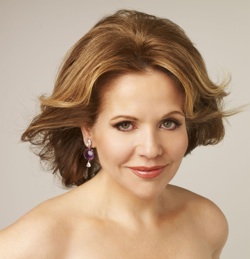 that "there is a season at all."
that "there is a season at all." Under continuing pressure from the recession, whose impact is not expected to ease until two years after the economy's recovery, Gockley is putting up a big fight to uphold San Francisco Opera's tradition of varied repertory, new works, and world-renowned singers.
"Despite these continuing hard financial times," Gockley says, "seven of our nine productions for the 89th season will be new to the War Memorial Opera House stage." (Having completed the difficult preparation of many months, Gockley is off to Houston for the birth of his first grandchild.)
The 2011-2012 season offers the world premiere of Heart of a Soldier, by Christopher Theofanidis and Donna Di Novelli (with Thomas Hampson and Merola-Adler alumna Melody Moore); company premieres of Donizetti's Lucrezia Borgia (Renée Fleming and Francesco Meli), Handel's Xerxes (Susan Graham and David Daniels), and John Adams' Nixon in China (Brian Mulligan), which had its world premiere in 1987 at the Houston Grand Opera when Gockley was heading that company.
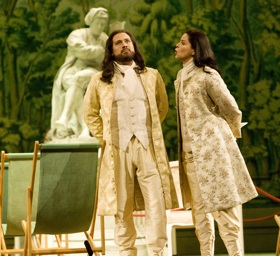
Productions new to San Francisco are Mozart's The Magic Flute, designed by Jun Kaneko; Mozart's Don Giovanni (Lucas Meachem and Ellie Dehn), by director Gabriele Lavia and designer Alessandro Camera; and the Teatro alla Scala coproduction of Verdi's Attila, with Ferruccio Furlanetto in the title role.
There will be cash-cow revivals of David Hockney's production of Puccini's Turandot (Iréne Theorin) and Jean-Pierre Ponnelle's production of Bizet's Carmen (Kate Aldrich, Italian-Brazilian tenor Thiago Arancam, and Polish-Brazilian baritone Paulo Szot).
Special events include a long-awaited tribute concert celebrating Frederica von Stade at Herbst Theatre, on Dec. 3, together with San Francisco Performances, Cal Performances, Philharmonia Baroque Orchestra, and the San Francisco Conservatory of Music.
The Opera Orchestra, led by Music Director Nicola Luisotti, will give concerts in UC Berkeley's Zellerbach Hall, on Oct. 28, 2011 and June 3, 2012.

Luisotti will conduct four productions (Don Giovanni, Carmen, Attila, and Turandot shared with Giuseppe Finzi), Patrick Summers two (Soldier, Xerxes), with company debuts by three youngish conductors: Italian Riccardo Frizza, 39 (Borgia), Holland's Lawrence Renes, 40 (Nixon), and Scotland's, Rory Macdonald, 39 (Flute).
On a projected $70 million budget, the company is offering 52 performances in the fall, and 22 in the summer, which means the challenge of selling approximately 240,000 tickets in the 3,146-seat Opera House.
Even if there is only standing room left for every performance — an impossible expectation — the estimated ticket revenue would still not cover half of the operating budget. To continue finding donations in bad or just uncertain economic times is the biggest challenge for the Opera, which maintains high standards producing the most expensive all art genres.
Season subscriptions run from $160 to $2,882 for the full season, available now. Single tickets, available beginning July, cost $21 to $330. Season subscriptions represent up to 30 percent saving over single tickets, additional donations suggested. The traditional $10 standing-room price in the Opera House will continue to be maintained.
The Sept. 25 Webcor Builders Presents Opera at the Ballpark simulcast of Turandot at AT&T Park is free and open to the public, but advance online registration is recommended.
Radio's Musical Chairs
In a complex, unexpected move impacting the Bay Area music community, KDFC-FM is being taken over by the University of Southern California, which operates Classical KUSC in Los Angeles.The immediate downside includes reduced power on 90.3 FM where the new station is moving immediately, pre-empting the University of San Francisco's KUSF-FM, which carried the live Saturday Metropolitan Opera broadcasts KDFC dropped years ago. KDFC programs on 102.1 will be broadcast only until Monday, when a different programming format will take over; the station remains under the ownership of Entercom Communications, which operates 110 stations in 23 markets.
Believed to be last ad-supported commercial radio in the country to switch to listener-supported public radio, KDFC is planning to continue with its management and on-air personnel, although its budget is likely to be reduced. In addition to 90.3, KDFC will broadcast on 89.9 in the North Bay.
The University of Southern California, which operates Classical KUSC in Los Angeles, has entered into an agreement with Entercom Communications that will preserve KDFC as the classical music station in the Bay Area.
"The new signals," says the release from the station, "will have minimal reception south of Oakland and San Francisco for now, but will continue to be available over the internet at KDFC.com." The displaced KUSF-FM also continues on the Internet.
An Opera Company Marching to a Different Drummer
Sixty-year-old Wexford Festival Opera has always been "different," producing only virtually unknown and rarely performed works. It's really outdoing itself this year, with the following (still preliminary) schedule:
Ambroise Thomas' 1855 La cour de celimene, Roman Statkowski's 1903 Maria, and Donizetti's 1839 Gianni di Parigi.
You may be way ahead of me, but I never even heard of Statkowski. Apparently, he was a Polish composer, teacher of Jan Maklakiewicz, Piotr Perkowski and Boleslaw Szabelski — who fared just a bit better than Statkowski.
Obviously, a big company with a long season couldn't make it by substituting Maria for Butterfly, however attractive that idea may be to veteran opera fans. In fact, even a small company such as Pocket Opera has a problem carrying on with its attractive offers of lesser-known opera.
Mystery of the Anonymous Translator
Speaking of Pocket Opera, meaning Donald Pippin, what's up with San Francisco Opera advertising Herbst Theatre screenings of the film made of Donizetti's The Elixir of Love "in English, with English subtitles," instead of calling it what is right and proper (and legal), namely "English translation by Donald Pippin"?
Pippin's translations are unique, and by all right, they should be clearly credited.
In other, happier, news about Pippin, his inimitable introductions to performances are being recorded, and will be released on a CD in the next few weeks. Watch this space for specifics soon.
A few samples, transcription courtesy of soprano Heidi Moss Sali, a producer of the project:
Magic Flute:The Queen also provides him — God knows why — with a most unlikely companion named Papageno, a bird-catcher by trade, a backwoods bumpkin who ... but no need for me to tell you about him. He will be more than happy to do so himself. The problem will be to shut him up.
The Haunted Manor:
When duty summons, howling babies and weeping wives must not stand in their way. At this point, we well-wishers can only say "Good luck!" Parenthetically, despite the inherent barbarism of war, it is reassuring to note a quaint touch of gentility still in evidence on the battlefield.
About Offenbach:
... a tiny, frail, odd-looking person who weighed about a hundred pounds and seemed to live entirely on nervous energy. God's gift to the newspaper caricaturists of his day, he might have been easily mistaken for a bizarre character escaped from one of his own operettas. My favorite description: "a cross between a bantam rooster and a grasshopper."
New YouTube Orchestra Selected
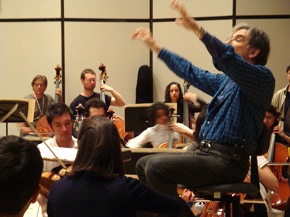
Some 100 young players will convene in Sydney in March for a week of rehearsals, master-classes and concerts at the Sydney Opera House, conducted by Michael Tilson Thomas.
Although the first YouTube project two years ago created a great deal of interest and received detailed coverage, the culminating concert was criticized as "ragged, uneven, of wildly different quality" (The Washington Post) and the The New York Times suggested that while "worthy, and in ways inspiring," it was more gimmick than substance. The Guardian went further, calling it "mediocre and pointless."
With high hopes for improvement, applicants submitted videos in November, finalists were announced last month, and then the voting frenzy began. American Idol-style, anybody could vote once a day, for as many candidates as they liked, by clicking a button next to the video on YouTube.
A report on the WQXR Web site says 12 finalists, out of 336 total, live in the New York City area. Among them, bass clarinetist and doctoral student Christine Carter, 27, sent e-mails to everyone she knew and contacted the newspaper in the town where she studied as an undergraduate. Clarinetist and graduate student Mark Dover, 23, e-mailed all his old teachers and band directors, and encouraged them to email all their friends, creating what he called an "exponential" effect.
Everyone made Facebook groups and events, continually reminding all their friends, in the Facebook sense of the word, to vote daily. "While I try not to make myself obnoxious, that might be a side-effect," said 24-year-old cellist and graduate student Ben Larsen. The WQXR report, by Corinne Ramey, was critical of the selection process:
A statement that confounded the finalist pool: The final decision rests with Michael Tilson Thomas. The conductor said that he consulted with a panel of musicians from major orchestras, which determined the finalist selection, and took into consideration the public vote but ultimately makes his decision based on artistic merit and personality. In the case of two equally qualified candidates, he does look at the personal stories and backgrounds of the musicians, he said.A traditional symphony orchestra audition takes place behind a screen, prohibiting the judges from knowing the identities of the applicants. Some women wear flats, so the clicking of heels won’t give away gender, and musicians don't talk so as not to disclose identity.
But the auditions for the YouTube Symphony Orchestra were anything but traditional. The tryouts took place not behind a physical screen, but a digital one — through hundreds of videos uploaded to YouTube, and viewed freely on computers around the world. They show applicants playing orchestral excerpts on couches, concertos in dorm rooms and a cellist playing a Bach prelude while sitting atop a camel in Jordan.
"In the sports world people are totally aware of life stories and past injuries of the members of a team,” said Tilson Thomas. "But we haven’t been aware of the life story of the bass clarinet player in our local orchestra. One of the reasons people root for their team is they have a sense of all the members of their team and what they contribute. The YouTube project explores how social media and technology can broadcast identity and personality, making the orchestra more than just an anonymous collection of musicians but a narrative that interacts with a community.
"You couldn’t be further away from playing something behind a screen."
California Symphony Plans
Walnut Creek's California Symphony, which terminated its music director last fall, is continuing operations with guest conductors:
- Michael Berkowitz, of the Santa Rosa Symphony, leads a pop concert Jan. 23, of music by Andrew Lloyd Webber, Bizet, Copland, and Bernstein
- George Cleve, of Midsummer Mozart, conducts a concert on March 6
- Ronald Zollman, director of orchestral studies at Carnegie Mellon School of Music, heads a "New Beginnings' concert May 1, featuring musical prodigies Roberto Granados and Rieku Tsuchida.
Adams in New York, Everywhere
To celebrate the Feb. 2 Metropolitan Opera premiere of John Adams' Nixon in China (coming to San Francisco in 2012, see top column item), Nonesuch is reissuing the Grammy Award–winning original cast recording in a three-CD set on Feb. 1. Adams is conducting the New York performances.
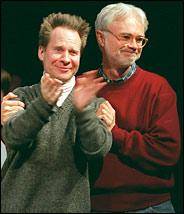
In addition to the live performances, the production will be simulcast live in high-definition in movie theaters around the world on Feb. 12, as part of the Met's Live in HD series. Encore screenings of the Feb. 12 performance will take place on March 2. at 6:30pm (local time) in the United States, and Saturday, March 12 in Canada (check theater for start time). For more information, visit metopera.org.
The CD set features a 68-page booklet with the complete libretto and new notes by Adams and director Peter Sellars, along with the original liner notes by librettist Alice Goodman and the late Michael Steinberg.
James Maddalena, who sang the role of Richard Nixon at the world premiere and on the Nonesuch original recording, reprises his interpretation at the Met. Edo de Waart leads the Orchestra of St. Luke’s on the album, which is available for preorder.
The recording also features Sanford Sylvan (Chou En-lai), Thomas Hammons (Henry Kissinger), Mari Opatz (Nancy T'ang, first secretary to Mao), Stephanie Friedman (second secretary to Mao), Marion Dry (third secretary to Mao), John Duykers (Mao Tse-tung), Carolann Page (Pat Nixon), and Trudy Ellen Craney (Chiang Ch'ing, Madame Mao Tse-tung).
Wagner Rules in Mahler
If you believe Percy and Felix Adlon, Gustav and Alma played only Wagner in their plangent four-hand piano duo moments.
The Adlons' Mahler on the Couch, which opened the New German Cinema Festival in the Castro Friday night has several such scenes, including a rapturous Walküre with a fair-to-middling soprano (by the name of Nina Berten, I think, as music credits are not easy to find).
The orchestral soundtrack is Mahler, and superb, Esa-Pekka Salonen conducting the Swedish Radio Orchestra. The first movement of Symphony No. 10 keeps coming back in various fragments, but the third movement of Symphony No. 4 and — especially — the Adagietto from Symphony No. 5 are just wonderful.
The movie? Somewhat overblown and with nonstop emoting, all those camera zooms may well make you dizzy. Documentary or fiction? In-between, with an honest opening note: "What happened is true, how it happened is not."
And yet, however the movie may strike you, it's all worth it just to witness the feature debut of the extraordinary Barbara Romaner as Alma. Johannes Silberschneider as Mahler and Karl Markovics as Freud are OK, but it will be difficult for any actress to take the "Alma identity" away from Romaner. It helps that she is not Hollywood-pretty, but rather real and believable.
Besides the S.F. screening, Mahler had a festival showing in L.A., I am not aware of commercial distribution plans. You're better off with a DVD of Ken Russell's 1974 Mahler anyway ... if you can find it.
MTT's 'Other Orchestra' in the Spotlight
Michael Tilson Thomas' New World Symphony is opening its new home in Miami's New World Center with a preview on Jan. 26 and the official opening on Jan. 28. The program: Overture to Wagner's The Flying Dutchman, the world premiere of Thomas Adès' Polaris: Voyage for Orchestra, and Copland's Symphony No. 3.
On Jan. 27, MTT will conduct "A Schubert Journey," with soprano Laura Aikin, tenor Diego Silva, violinist Joel Smirnoff, and pianist Jeremy Denk. The program is called "A continuous journey through the lyric genius of Franz Schubert" — programs we could use at Davies Symphony Hall.
New Exit of Musicians from Central Europe?
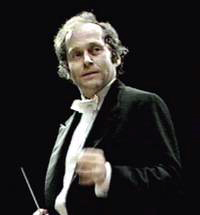
Before and during World War II, thousands of musicians and artists escaped Nazi regimes in Europe, tasking a wealth of talent to the U.S., England, and elsewhere in the West. Further below, see a partial list of musician refugees from Hungary alone.
Why is this a matter of news now, in a new century, six-seven decades after the exodus? Because several prominent musicians have declared that Hungary's slide into extreme right-wing politics is prompting them to leave the country.
Ádám Fischer, who resigned his position as chief conductor of the Hungarian National Opera in protest against government meddling and instances of antisemitism told Die Welt last week that xenophobia and racism are widespread in the country. Another Hungarian Jewish artist, pianist András Schiff — a frequent visitor to San Francisco — also announced that he will not return to his native country because of the current atmosphere.
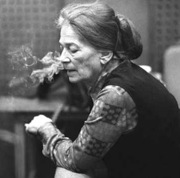
As Hungary is taking the chair of the European Union, the matter is receiving widespread coverage. In The Independent, it is reported that "Hungarian writers and musicians have descended on Brussels to add their voices to a fast-growing chorus of criticism aimed at measures being introduced by their Prime Minister Victor Orban. The outcry centres on a new media law that opponents say will muzzle press freedom and endanger independent media."
In another twist in the story, the controversial new media law is at least partially aimed at preventing overt antisemitic and anti-Roma statements.
As to the last great exodus of musicians from Hungary for political reasons (or just plain self-preservation), consider just a few names: composers Béla Bartók, Emerich Kálmán, Mátyás Seiber, Paul Ábrahám, Miklós Rózsa, and Erich Korngold.
Conductors Sir Georg Solti, George Baráti, Antal Doráti; pianists György Sándor, Géza Anda, Ilona Kabos, Annie Fischer, Louis Kentner, Lili Kraus, Joseph Weingarten, Andor Földes, Géza Frid; singers Lorenzo Alvary, Gábor Carelli, Dezso Ernster, Lászlo Chabay; cellists János Scholz, János Starker; and violinists Joseph Szigeti, Michael Kuttner.
What a waste for one country, what riches for others! Not counting, of course, hundreds of musicians who perished in concentration and work camps, including composers Pál Budai, Jeno Deutsch, György Justus, Sándor Kuti, Walter Lajthai-Lazarus, Sándor Vándor, and László Weiner. There are many omissions here, none on purpose — it's just difficult to gather a complete list together.
It's a disturbing question: If Germany can and does implement the idea and policy of "never again," why can't Hungary?
